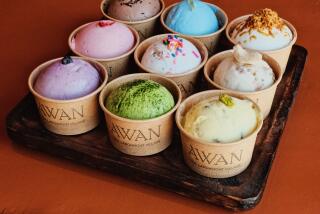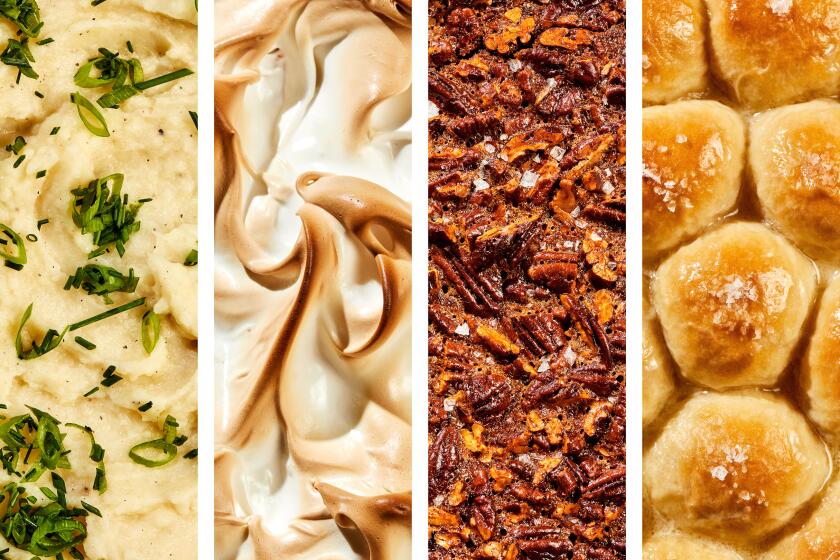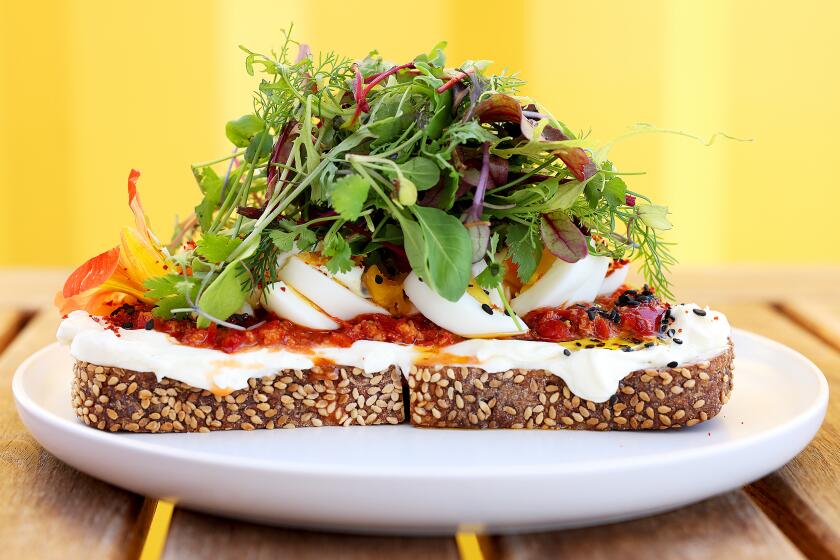A Natural Strategy for Success : Sandy Gooch figured other people must share her aversion to chemical additives and artifical flavorings. She was right.
Don’t tell Susan Terry that a whole-wheat Linzer torte sweetened with fruit juice tastes as good as the white-flour-and-refined-sugar version. Like others shopping recently at the Mrs. Gooch’s natural food store in Sherman Oaks, Terry knows what she likes--the sugary one--but she also knows what’s good for her.
Terry says of Mrs. Gooch herself: “She’s done a fantastic job of upgrading the world of health food stores.”
Actually, plenty of Mrs. Gooch’s customers see organic pastries as an example of the elevation of health food stores to a gourmet trade. But if there’s a marketing strategy in that elevation, Sandy Gooch, 52, the founder and part-owner of the six-store chain, doesn’t like to talk about it.
Gooch likes to talk about how she started her Sherman Oaks-based chain of natural food stores in 1977 after a near-fatal sip of a diet soda that laid her out with an allergic reaction to a food additive. She likes to talk about her mission and the Mrs. Gooch’s philosophy: avoiding chemical additives, artificial flavorings and refined sugar--basically, a big “no” to what most people eat.
Upscale Touches
What’s wrong with shopping at Vons or Ralph’s or Lucky stores? “I don’t know that anything is really wrong with shopping” at the big supermarket chains, Sandy Gooch says. “But if you’re concerned about your health, it’ll probably take a lot longer to shop at those markets.”
Gooch and her chief executive, John Moorman, aren’t running typical brown-rice-and-wheatgerm health food stores. Mrs. Gooch’s will do about $75 million in sales this year. Sure, they sell fresh wheatgrass juice, but the clean stores also have subdued lighting, a gourmet deli with barbecued chicken brochettes and whole-wheat croissants and a high level of service--the upscale touches that have made Mrs. Gooch’s popular in Sherman Oaks, Beverly Hills, West Los Angeles and Hermosa Beach.
For most supermarkets, it takes moving a mountain of meat and potatoes to turn a profit. The average profit for full-service supermarkets is a mere 1.5 cents per dollar of sales. Gooch claims that her chain averages closer to 2 to 2.5 cents profit.
That may have something to do with the fact that natural foods are now more for yuppies than hippies.
“The so-called baby boom is growing up and realizing they, too, get old and are just that much more concerned with exercise and health,” said Anthony Harnett, the owner of Bread & Circus, a successful $50-million-a-year chain of natural good groceries in Boston.
Unsurprisingly, Mrs. Gooch’s stores in L.A. are in the same places where there are plenty of well-educated, well-to-do people, aged 25 to 50, who are willing to spend top dollar on food. But maybe talking about marketing doesn’t make for good marketing.
Gooch reluctantly admits that her company studies demographics closely. In fact, the average neighborhood or city where Mrs. Gooch’s are located beats countywide average household income figures by about 33%.
Gooch also doesn’t like to talk about how much more it costs to shop at one of her stores than at a regular supermarket. In a highly unscientific test, a pre-selected list of groceries, from steak and broccoli to dish soap, recently cost about 30% more at a Mrs. Gooch’s store than at a Vons store just down the street.
But Gooch said that was a fluke and estimated that a person buying basic brands at a typical grocery store would pay only 5% more to shop for natural foods at her stores.
For true believers in health food, Mrs. Gooch’s has much to offer--like wheatgrass juice (85 cents for an ounce), a brew that Gooch claims is a mixer for drinks and that’s molecularly similar to human blood. “If somebody wants a high, I suggest they try” it, she said. But Gooch admitted someone once told her the taste “reminds them of doggie breath.”
Simulating Junk Food
The trick to marketing natural food to baby boomers isn’t in preaching to the ranks of wheatgrass juice drinkers, it’s in striking a fine balance between what average customers think that they should eat and what they crave. The lesson was driven home in 1987 to Anthony Harnett, owner of Bread & Circus, a successful natural food chain in Boston, when he tried to remove alcohol and caffeine from store shelves on the grounds that they are both addictive drugs. He was faced with a customer rebellion.
Gooch has avoided a similar rebellion by never selling alcohol or caffeine in the first place. But she’s well aware that she has to offer her customers products that at least simulate some of the junk food that they are accustomed to eating. “We’re not saying people have to walk around with tofu and sprouts hanging from their mouths,” Gooch said. So her stores sell everything from ice cream and cookies (flavored with fruit juices, not sugar) to carob candy bars.
Some big, traditional grocery chains have started imitating natural food stores, according to Patricia Heydlauff, executive director of the National Nutritional Foods Assn. Stuart Rosenthal, executive vice president for marketing for the Vons Companies, Inc., says most Vons stores now sell organically grown produce, and like Mrs. Gooch’s, Vons is trying to give customers more nutritional information--particularly about fat and cholesterol.
But with a 23% share of the Los Angeles grocery market (according to Grocery Marketing magazine), Vons isn’t looking over its shoulder. “Are we threatened by Mrs. Gooch’s?” asked Rosenthal. “No.”
More to Read
Eat your way across L.A.
Get our weekly Tasting Notes newsletter for reviews, news and more.
You may occasionally receive promotional content from the Los Angeles Times.










